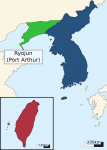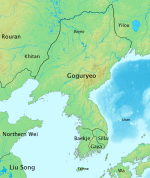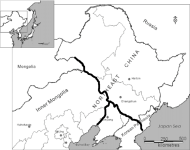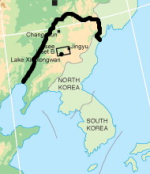In the Sino-Japanese War, Japan gained Southern Manchuria. Russia, joined by Germany and France, came in and forced Japan to give it back in exchange for a larger indemnity. Russia proceeded to take Port Arthur for itself.
What if there'd been no Tripartite Intervention? Russia could still secure the rest of Manchuria for itself, and have worthwhile ports at Huludao and Qinhuangdao.
It's possible that Japan would want more of Manchuria down the line, but that's hardly inevitable. Japan prior to the Russo-Japanese War was willing to accept a compromise of Korea for Japan and Manchuria for Russia. Without two stolen victories (1895 and not gaining North Sakhalin in 1905) Japan might not be as aggressive or revanchist.
View attachment 58446
This is a wonderful question - here is a bare bones, minimal assumptions answer -
Japan is proud of its victory, and develops its dominance over Korea and the Liaodong peninsula faster
Japan gets less of an indemnity from China (and China loses a little less from its Treasury and takes out somewhat fewer loans), slightly curtailing Japanese fleet/army spending, giving China marginally more fiscal options
Japan has no particular reason to be angry with Russia, Germany or France.
Japan has no particular reason to tie itself to an exclusive alliance with one power, like Britain, so a a unilateral policy, but seeking positive relations with all powers wherever possible, seems a good way to go.
Japan is probably content with developing and integrating its new imperial sphere over the the next decade and a half, and does not sweat Russia's increased interest in a north Manchuria railroad (Chinese Eastern railway) spur line off the Trans-Siberian from Chita, Siberia leading to Vladivostock.
It is tempting to say that without the Triple Intervention, and the consecutive German, Russian, French, and British grabs for ports at Qingdao, Port Arthur, Guangzhouwan/Ft. Bayard, and Wei hai wei and Hong Kong new territories, there is not that latter OTL late 1890s feeding frenzy for new Chinese treaty ports and leased territories. However, the Triple Intervention may not have been a necessary precursor for it. The only necessary precursor might have been Japan proving China was a paper tiger, even weaker than everyone thought. So, all those ports and leases might be grabbed by those powers, on historical schedule, with the only difference being that Japan, not Russia gets the Port Arthur/Dairen port on the Liaotung peninsula area. Russia gets its compensation elsewhere, in northern Manchuria, through rail rights of way.
Theoretically Japan could try to encourage China to resist these subsequent European demands by Germany and others, but I doubt they would overpromise support to the Chinese or invest too much effort, or that the Chinese would want to become overdependent on the Japanese.
Japan does not sweat the Spanish-American war, American victory, and takeover of the Philippines.
Assuming all the above, anti-foreignism and the Boxer rebellion should still explode circa 1900, and Japan should probably participate with the Europeans in the 8 nation alliance.
Russian naval development in the Pacific, such as it is, concentrates in Vladivostock.
I assume the same factors restraining the Europeans, especially Russians, from Triple Intervention, also restrain the Russians from big moves in Korea.
Therefore, Korea may be ripe for Japanese annexation around 1902 or so, without an interlude of playing off the Russians as a counter-balance.
Japan doesn't have a reason to choose sides in European alliances.
Without Russian defeat and revolution in 1904-1905 Russia is a more confident power and seen as more powerful. This likely leads its tensions with Austria-Hungary to escalate to a Europe-wide war by 1908, after the Young Turk revolution (unless that is butterflied away) calls Bosnia's permanent sovereignty (de jure Ottoman, de facto Austian) into question.
There is a decent chance that in this war, Russia backs Serbia, Germany backs Austria, and France backs Russia. However, because of Britain perceiving Russia as a greater threat, Britain intervenes on the side of Germany & Austria, or is a neutral, leaning in their direction.
If that is the case, the result should be a Franco-Russian defeat within about two years.
Japan would not have a stake in the war at first, but after Russia faces defeat and revolution, it would probably find the opportunity to expand in a power vacuum left in northern Manchuria and the Russian Far East an irresistible opportunity. Less likely, but possible, it could do the same in French Indochina. But in French Indochina, the British may get to move first.
On the other hand, there is a chance that German planning by this point forces Germany to attack west first, through Belgium, and this genuinely overrides and drives and determines British policy, and Britain sides with France and Russia against Germany. In that case the Entente has the advantage, and Japan again has no stake in the war and starts it off neutral.
The Entente could win early, with no bad consequences for Russia, if the tech balance in artillery at this moment is such that the French have a great advantage on the western front, and this is compunded by blockade limiting German access to nitrates over time.
However, during the whole war, the untested paper armies of Russia are at danger of collapse and the country in danger of revolution.
*If* Germany survives long enough, and *if* Germany has working U-Boat technology to deploy against the blockading British, Germany will use it, eventually in an unlimited fashion. This could well prompt the USA under the Taft Administration to go to war. Once it sets that precedent, other countries with a lot of merchant shipping that may be victimized may declare war on Germany (much like several Latin American states in OTL), and if "everybody's doing it" this may include Japan. Micronesia and Tsingtao probably would be already occupied by the Allies at this point, so no loot. But under the decent assumption of Russian Revolution and civil war, even in Allied victory, Japan will likely expand its sphere of influence on mainland northeast Asia.






